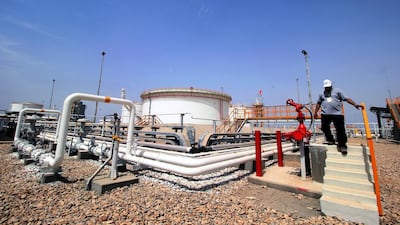Although aluminium is used to make fighter planes and missiles, it has not generally been thought of as a strategic material.
But recent US sanctions have caused its price to rocket and then plummet. The metal’s gyrations are a warning of what may happen as more states come into the firing line for oil sanctions.
The US put restrictions on Russia’s Rusal, the world’s second-biggest aluminium producer, preventing it from doing business in the US, to punish the country over its wars in Ukraine and Syria and subversion of western democracies. The sanctions targeted Oleg Deripaska, a confidant of Russian President Vladimir Putin, whose En+ Group owns 48 per cent of Rusal. Viktor Vekselberg, another major Rusal owner, is also sanctioned; he was formerly a major shareholder in oil venture TNK-BP before it was sold to state giant Rosneft. Rosneft chief and Putin ally Igor Sechin has also been under interdict since 2014.
Aluminium prices rose 30 per cent over two weeks as customers scrambled to find alternative supplies. Miner Rio Tinto had the opposite problem, looking for an outlet for the raw material alumina it produces. European companies, users of aluminium such as car makers, have complained of damage from the Rusal affair.
The US then backtracked, giving the company more time to extract itself from its US operations, and prices fell back significantly, before jumping again as it appeared Mr Deripaska would stay at the helm.
This continuing saga teaches three lessons for the prospects of a much bigger and more volatile market: oil. The current White House is inclined to impose, modify and enforce sanctions abruptly and unpredictably, amplifying uncertainty and unintended consequences. The US is often not clear about precisely what its measures are trying to achieve: to send a signal; hurt an adversary; collapse a regime; or simply change its behaviour. At a time already of “trade war” fears, allies can be harmed and they then defend their own interests.
Three major oil producers are in the administration of US President Donald Trump's sights for sanctions: Russia again; Venezuela; and Iran. The political drivers in each case, the possible sanctions and their impact are different. But together they can add up to a serious shock to the market.
Some financing, investment and technology transfer to the Russian oil and gas industry is already forbidden. This will hit future production, but did not prevent the start of the Yamal liquefied natural gas project, which secured Chinese funding and partnership from French oil major Total. US senators and diplomats want to block the Nord Stream 2 pipeline, which they fear would deepen European dependence on Russian gas. But while some European countries agree, powerhouse Germany wants the project.
The US has made little secret that its “energy dominance” agenda includes profiting financially and geopolitically from selling more liquefied natural gas to Europe. Oily oligarchs in Mr Putin’s inner circle might be targeted by further sanctions, but direct action against Russian oil exports is very unlikely.
_______________
Read more:
Opec’s grand bargain on output is at risk of becoming a victim of its own success
Enormous Saudi Arabian solar push could lead to new Middle East energy era
_______________
Venezuelan production is already in free-fall, dropping 1 million barrels per day since early 2016. It is surprising it manages to export anything at all, with oilfield workers starving and stealing spare parts to survive but not allowed to resign, employees of foreign oil firms arrested for “treason” for refusing to sign corrupt contracts, three out of its four refineries shut down, and a shortage of cash to buy oil for blending with its heavy crude.
Sanctions could prevent Venezuelan oil exports to the US, which would be a big problem for American refineries that need heavy crude to balance their light domestic feedstock. Or they could ban insuring cargoes of the country’s crude. Such measures would cause a collapse of the remaining economy, a messy default on debt, unpredictable political fallout in Caracas, and Russian and Chinese lenders picking over the carcass.
Iran is the most explosive of the geopolitical risks currently firing up the oil market. 2012-15’s multilateral sanctions imposed under US President Obama cut its exports by 1.3 million barrels per day at the deepest point. French President Emmanuel Macron and German Chancellor Angela Merkel have sought to convince Mr Trump to stay in the nuclear deal negotiated by his predecessor, but he looks likely to refuse to reissue sanctions waivers on the May 12 deadline.
At this point, it remains entirely unclear what restrictions would be reimposed, how vigorous and skilful enforcement would be, and how able foreign governments would be to protect their companies buying or investing in Iranian oil from extraterritorial sanctions. Some, perhaps many, oil traders would be warned off, but Chinese and Indian buyers and the grey market might pick up the spare barrels.
It is not clear what incentive Iran would have to renegotiate a deal with a party that has already reneged, nor that the US administration really knows what kind of “fix” it wants.
But a tightening oil market could be squeezed yet more by sanctions or total freefall in Venezuela combined with strong measures against Tehran. Other Opec countries would undoubtedly be called on to put more oil on the market, risking the coherence of their pact with Russia to cut production.
With domestic petrol prices already rising, Mr Trump would have to choose between backtracking, escalating, or risking losses in November’s key Congressional elections. Oil is more combustible than aluminium, and the sanctions weapon, wielded haphazardly, can spark a conflagration.
Robin M Mills is CEO of Qamar Energy, and author of The Myth of the Oil Crisis


